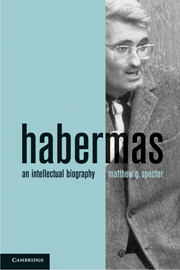Book contents
- Frontmatter
- Contents
- Acknowledgments
- HABERMAS: AN INTELLECTUAL BIOGRAPHY
- Introduction
- 1 The Making of a ′58er: Habermas's Search for a Method
- 2 Habermas as Synthesizer of German Constitutional Theory, 1958–1963
- 3 1961–1981: From the “Great Refusal” to the Theory of Communicative Action
- 4 Civil Disobedience, Constitutional Patriotism, and Modernity: Rethinking Germany's Link to “the West” (Westbindung), 1978–1987
- 5 Learning from the Bonn Republic: Recasting Democratic Theory, 1984–1996
- Conclusion
- Bibliography
- Index
3 - 1961–1981: From the “Great Refusal” to the Theory of Communicative Action
Published online by Cambridge University Press: 05 June 2012
- Frontmatter
- Contents
- Acknowledgments
- HABERMAS: AN INTELLECTUAL BIOGRAPHY
- Introduction
- 1 The Making of a ′58er: Habermas's Search for a Method
- 2 Habermas as Synthesizer of German Constitutional Theory, 1958–1963
- 3 1961–1981: From the “Great Refusal” to the Theory of Communicative Action
- 4 Civil Disobedience, Constitutional Patriotism, and Modernity: Rethinking Germany's Link to “the West” (Westbindung), 1978–1987
- 5 Learning from the Bonn Republic: Recasting Democratic Theory, 1984–1996
- Conclusion
- Bibliography
- Index
Summary
The political protest campaigns of the 1960s were the crucible in which Habermas's theoretical commitments of the 1970s were forged, but not in the way it is usually imagined. The received picture of the impact of 1968 on Habermas is the following: “[As] … the student movements overtake the mainstages of Paris, Berlin [and elsewhere], … [Habermas] gradually devolves from an intellectual leader of the progressive German left into a reform-minded German professor, formal philosopher (more neo-Kantian and Hegelian than Marxian), and legal scholar.” Burned by encounters with leftist students who saw him as a betrayer of their movement, Habermas thus is supposed to have retreated into the development of a formal theory of communication. The image of a theorist in retreat is nourished by his professional move from the public University of Frankfurt to the more protected ivory tower environment of the Max Planck Institute, an institution devoted solely to academic research. In 1970, he assumed the codirectorship of the Max Planck Institute for the Study of the Scientific-Technical Conditions of the Lifeworld in Starnberg.
However, Habermas did not retreat or recoil from a more leftist theoretical position into the theory of communicative action. The years 1969–70 marked a significant caesura in German politics and intellectual life generally.
- Type
- Chapter
- Information
- HabermasAn Intellectual Biography, pp. 87 - 132Publisher: Cambridge University PressPrint publication year: 2010



